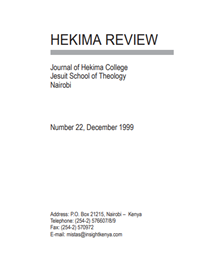Crises in the Great Lakes Region: What can the Church do to Intensify its Contribution for Peace?
Keywords:
Great Lakes Region, Conflict, Church, warAbstract
Efforts carried out to restore peace in many parts of Africa, show seem to favour the simplistic Western response of well-ordered peace talks, after a cease-fire has been agreed to, and military intervention is limited to humanitarian ends. Such strategies yield little on the ground: experience has shown that “they are always surpassed by the fast moving African dictated agenda using both violence and psychology”. The effects of such an agenda are brutal, and lead to major abuses of human rights, creating large-scale human suffering.
As an institution which serves human development, the Church can not afford to ignore the continuation and escalation of these conflicts. Speaking in God’s name, it opposes them because they are against the order of nature and the purpose of creation. The struggle for peace today is a requirement of our faith. St. Matthew reminds us, “Blessed are the peace makers for they shall be called sons of God”. (Mt. 5:9). Certainly the Church in countries plagued by conflicts has always played the role of peacemaker, yet the “effects of righteousness” remain a dream. What might be the reasons behind the failures of the Church’s effort to obtain peace? Our attempt here is to revisit the crises, the causes behind them, and their terrible effects on humanity, and examine how the Church has been responding to all that. Our purpose is to set new strategies and an agenda that the church can embrace in its contribution to the restoration of peace in the Great Lakes.
Downloads
Downloads
Published
Issue
Section
License
Copyright (c) 2024 Hekima Review

This work is licensed under a Creative Commons Attribution-ShareAlike 4.0 International License.


